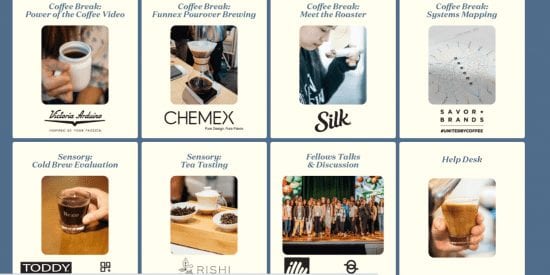
Adapted for COVID-19, Re:co’s first online event put the pandemic in context and addressed ramifications for the coffee industry.
BY MARK VAN STREEFKERK
BARISTA MAGAZINE ONLINE
Every year, coffee professionals, scientists, economics experts, and other renowned speakers meet for a two-day intensive set of panels, presentations, discussions, and networking at Re:co Symposium. Re:co is short for “Regarding: Coffee,” and is hosted by the Specialty Coffee Association (SCA).
This year’s Re:co was originally scheduled for the end of April in Portland, but with COVID-19 halting travel plans and prohibiting large gatherings of people, the event went completely online, with 430 individuals attended virtually—about the same number as in previous years. Sessions were presented on a virtual Main Stage, and at any time attendees could break away into various discussion chat rooms, in addition to the coffee breaks between sessions. An anticipated part of Re:co is the Sensory Experience, which contains hands-on demonstrations that encourage participants to develop their sensory acumen through beverage and food. For an additional fee, attendees could get a curated sensory experience home kit shipped to them, which they would be instructed to use in various rooms in the Experience Hall.

COVID-19 on the coffee market.
Re:co started with “The State & Future of the Specialty Coffee Industry,” which set the tone for the rest of the Symposium. In this session, speakers presented data that showed how COVID-19 has affected the world economy, what that means for coffee, and what we can expect from here.
Laura Alfaro, economist and Warren Alpert professor of business administration at Harvard Business School, described the current global “health shock,” and said, “To solve the crisis we need to solve the health problem.” Reflecting on what has proved effective so far, she urged more cooperation between public and private agencies working with both businesses and scientists to develop short- and long-term solutions.
Yannis Apostolopoulos, CEO of SCA, presented data about how coffee is faring in a global market affected by COVID-19. Yannis observed the drop in coffee output by 2.4 million bags, and noticed changes in consumer experience, including increased digitization as people order coffee to brew at home. James Watson, beverage industry analyst at Rabobank, noted the massive increase in purchases of brewing equipment—especially the sales of grinders, which are at an all-time high. As coffee consumption moves from the café into the home, James asked how we can find the right outlets to reach consumers. “Specialty coffee is massively underrepresented in core grocery stores, certainly in big-box stores … we know people want better coffee. You can see almost no local coffee brands in the grocery store, but if you go down the beer aisle, it’s going to be flooded with craft beer options … coffee doesn’t look like that at all,” he said.

James of Rabobank explained it’s the perfect time for a grocery store to scout more local coffees, or for local coffees to team up and approach bigger retail outlets. In part two of the session, Albert Scalla, senior vice president of trading at INTL FCStone Financial, said that during COVID-19, every single commodity dropped in the market. For coffee there’s been “massive volatility in supply and demand,” but one thing that can help stabilize that is by promoting consumption, and encouraging more transparency, including blockchain technology.
The final speaker in “The State & Future of the Specialty Coffee Industry” was Jan Anderson, CEO of Premium Quality Consulting, LLC, who presented her own, and other industry professionals’, ideas on moving forward from crisis. These ideas included transforming coffee shops into something more like an open-air sidewalk café, à la European cafés, or as Keba Konte of Red Bay Coffee suggested, a kiosk-style café.
So much ground was covered in only the first session of Re:Co, and a lot of honest assessments were made. While the situation is dire right now, there was a lot of optimism, at least where coffee is concerned. “I really don’t think we’ll see any long-term repercussions from this pandemic when we look out in two or three years,” said Jonathan Rubinstein, founder and CEO of Joe Coffee.
Stay tuned for more wrap-ups of Re:co at Barista Magazine Online, including the highly anticipated “Race, Specialty Coffee, and the Urgent Need for Progress” on the second day.

ABOUT THE AUTHOR
Mark Van Streefkerk is Barista Magazine’s social media content developer and a frequent contributor. He is also a freelance writer, social media manager, and novelist based out of Seattle. If Mark isn’t writing, he’s probably biking to his favorite vegan restaurant. Find out more on his website.
